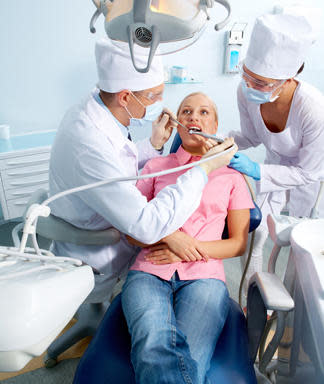10 Things Your Dentist Wants to Tell You
By Amanda Greene
For some reason-maybe it's the loud drills or uncomfortable mouth contortions-a visit to the dentist isn't considered to be the most pleasant way to spend an afternoon. But if you think it's all fun and games for your doctor, think again. There are plenty of things that you're doing-or not doing-that aren't exactly making your dentist smile. We talked to a bunch of docs to get the scoop on everything they wish you'd brushed up on before you arrived in their chair. Read on to improve your teeth health know-how as well as make your next appointment that much more enjoyable.
1. You probably aren't brushing enough.
"Most of my patients brush for less than a minute, leaving about half of the overnight plaque behind," says Robert Gerlach, DDS, MPH, a research fellow in Worldwide Clinical Investigations at Procter & Gamble. His advice: Brush for at least two minutes, twice daily and change your toothbrush every three months to get the best at-home care.
2. Oral cancer is one of the most deadly types of cancer.
According to New York City-based dentist Lindi Orlin, DMD, most people don't notice warning signs of oral cancer-like lesions-in their mouths. "If patients have red bumps or spots in their mouth, they often ignore them, which can lead to much more serious problems down the line." So if you see something, no matter how small, say something to you dentist.
3. Take off your lipstick!

"Lipstick is always a disaster," says holistic dentist Victor Zeines, DDS, author of Healthy Mouth, Healthy Body. "People come in and don't think to wipe it off, and some almost get offended when I ask them to do so. But it gets all over my gloves, your teeth and everything we're trying to do."
4. Sometimes exercise can contribute to dental problems.
Sure, breaking a sweat is great for your health, but you also need to be conscious of the ways that it can impact your smile. "Vigorous exercise can cause dehydration and limit the protective role of saliva, which can put you at a greater risk for cavities and bacterial accumulation," says Dr. Gerlach. "Also, many sports drinks are unexpected sources of sugars and acids, which can erode tooth enamel." So, stick to water-and plenty of it-when you hit the gym.
5. You can't be healthy without a healthy mouth.
Many people assume that their mouth is an isolated site when it comes to their body, but it can often strongly indicate when something is wrong-or right-with the rest of you. "What's going on in your mouth is affecting the rest of your body," says Dr. Zeines. "You simply can't be healthy if your mouth isn't healthy." For example, if you have gum disease, you're four times more likely to have a heart attack or stroke. Also, an otherwise healthy but painful lower first molar can signal digestive troubles.
6. Tell your dentist if you take a daily aspirin.
"Because it's such a small dose and they take one every day, most patients don't consider aspirin to be a drug," says Dr. Orlin. "I really wish they did, and wish they'd let me know, because it can cause excess bleeding, especially during extractions."
Check out 5 surprising ways you can use aspirin around the house.
7. Bleeding gums are a red flag.
Yes, your gums may bleed after a particularly vigorous brushing session or after flossing for the first time in a while, but if they bleed consistently, there's a problem. "Bleeding gums are a sign of inflammation-basically, you're walking around with an infected mouth, which could potentially spread to the rest of your body," says Dr. Zeines. In his holistic practice, patients with chronic gum bleeding are given an evaluation and provided with supplements to start building up their immune system to fight off the infection.
8. Abrasion agents in toothpaste aren't always bad.
"Most patients think that abrasion agents in toothpaste are bad for their teeth," says Adam Diasti, DDS of Luster Premium White. "Quite the opposite--mild abrasives, like silica and papain, in toothpaste help remove stain, whiten and polish teeth."
9. Cavities aren't just from eating too much sugar.
Nixing sweet treats from your kitchen may not help prevent cavities: A balanced diet is truly the key to a healthy smile. "When I see people with cavities or gum disease, I usually find that the body is not in balance," says Dr. Zeines. "In other words, your diet is usually off, which can make your mouth too acidic, fostering a breeding ground for cavities and gum disease." A colorful selection of healthy, whole foods is the key to preventing cavities.
10. Take a closer look at your tongue.
According to Dr. Zeines, your tongue can provide a lot of insight into your overall health. "If the tip of your tongue is red, that may indicate a thyroid defect or heart problem, whereas a tongue with a yellowish-green tint can indicate liver or gallbladder problems. If it's grayish-brown, there's usually something wrong with your digestion." So don't wait until your next dentist appointment for your doctor to uncover news about your health-say "ahh" to get a handle on your whole body.
Original article appeared on WomansDay.com.
Related Articles at WomansDay.com:
8 Things You Didn't Know About Toothpaste
10 Tips for Whiter Teeth
22 Ways to Save on Health Care
